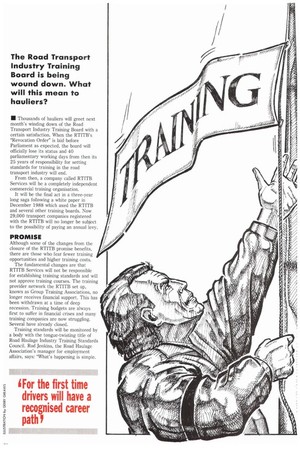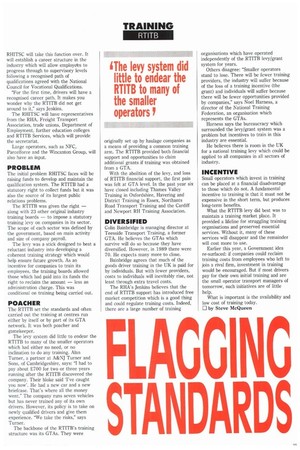• Thousands of hauliers will greet next month's winding down
Page 36

Page 37

If you've noticed an error in this article please click here to report it so we can fix it.
of the Road Transport Industry Training Board with a certain satisfaction. When the RTITB's "Revocation Order" is laid before Parliament as expected, the board will officially lose its status and 40 parliamentary working days from then its 25 years of responsibility for setting standards for training in the road transport industry will end.
From then, a company called RTITB Services will be a completely independent commercial training organisation.
It will be the final act in a three-year long saga following a white paper in December 1988 which axed the RTITB and several other training boards. Now 29,000 transport companies registered with the RTITB will no longer be subject to the possibility of paying an annual levy.
Although some of the changes from the closure of the RTITB promise benefits, there are those who fear fewer training opportunities and higher training costs.
The fundamental changes are that RTITB Services will not be responsible for establishing training standards and will not approve training courses. The training provider network the RTITB set up, known as Group Training Associations, no longer receives financial support. This has been withdrawn at a time of deep recession. Training budgets are always first to suffer in financial crises and many training companies are now struggling. Several have already closed.
Training standards will be monitored by a body with the tongue-twisting title of Road Haulage Industry Training Standards Council. Rod Jenkins, the Road Haulage Association's manager for employment affairs, says: "What's happening is simple. RHITSC will take this function over. It will establish a career structure in the industry which will allow employes to progress through to supervisory levels following a recognised path of qualifications agreed with the National Council for Vocational Qualifications.
For the first time, drivers will have a recognised career path. It makes you wonder why the RTITB did not get around to it," says Jenkins.
The RHITSC will have representatives from the RHA, Freight Transport Association, trade unions, Department of Employment, further education colleges and RTITB Services, which will provide the secretariat.
Large operators, such as NFC, Parcelforce and the Wincanton Group, will also have an input.
The initial problem RHITSC faces will be raising funds to develop and maintain the qualification system. The RTITB had a statutory right to collect funds but it was also the source of its largest public relations problems.
The RTITB was given the right — along with 23 other original industry training boards — to impose a statutory training levy on companies in its sector. The scope of each sector was defined by the government, based on main activity and size of company payroll.
The levy was a stick designed to beat a reluctant industry into developing a coherent training strategy which would help ensure future growth. As an incentive for companies to train its employees, the training boards allowed those which had paid into its funds the right to reclaim the amount — less an administration charge. This was conditional on training being carried out.
The RTITB set the standards and often carried out the training at centres run either by itself or by part of its GTA network. It was both poacher and gamekeeper.
The levy system did little to endear the RTITB to many of the smaller operators which had either no need, or no inclination to do any training. Alan Turner, a partner at A&NJ Turner and Sons, of Cambridgeshire, says: "I had to pay about £700 for two or three years running after the RTITB discovered the company. Their bloke said Tve caught you now'. He had a new car and a new briefcase. That's where all the money went." The company runs seven vehicles but has never trained any of its own drivers. However, its policy is to take on newly qualified drivers and give them experience. "We take the risks," says Turner.
The backbone of the RTITB's training structure was its GTAs. They were originally set up by haulage companies as a means of providing a common training arm. The RTITB provided both financial support and opportunities to claim additional grants if training was obtained from a GTA.
With the abolition of the levy, and loss of RTITB financial support, the first pain was felt at GTA level. In the past year six have closed including Thames Valley Training in Oxfordshire, Havering and District Training in Essex, Northants Road Transport Training and the Cardiff and Newport RH Training Association.
Colin Bainbridge is managing director at Teesside Transport Training, a former GTA. He believes the GTAs which survive will do so because they have diversified. However, in 1989 there were 70. He expects many more to close.
Bainbridge agrees that much of the goods driver training in the UK is paid for by individuals. But with fewer providers, costs to individuals will inevitably rise, not least through extra travel costs.
The RHA's Jenkins believes that the end of RTITB support has introduced free market competition which is a good thing and could regulate training costs. Indeed, there are a large number of training organisations which have operated independently of the RTITB levy/grant system for years.
Others disagree: "Smaller operators stand to lose. There will be fewer training providers, the industry will suffer because of the loss of a training incentive (the grant) and individuals will suffer because there will be fewer opportunities provided by companies," says Noel Harness, a director of the National Training Federation, an organisation which represents the GTAs.
Harness says the bureaucracy which surrounded the levy/grant system was a problem but incentives to train in this industry are essential.
He believes there is room in the UK for a national training levy which could be applied to all companies in all sectors of industry.
Small operators which invest in training can be placed at a financial disadvantage to those which do not. A fundamental incentive to training is that it must not be expensive in the short term, but produces long-term benefits.
What the RTITB levy did best was to maintain a training market place. It provided a lifeline for struggling training organisations and preserved essential services. Without it, many of these services will disappear and the remainder will cost more to use.
Earlier this year, a Government idea re-surfaced: if companies could reclaim training costs from employees who left to join a rival firm, investment in training would be encouraged. But if most drivers pay for their own initial training and are the small operator transport managers of tomorrow, such initiatives are of little help.
What is important is the availability and low cost of training today.
LI by Steve McQueen




















































































